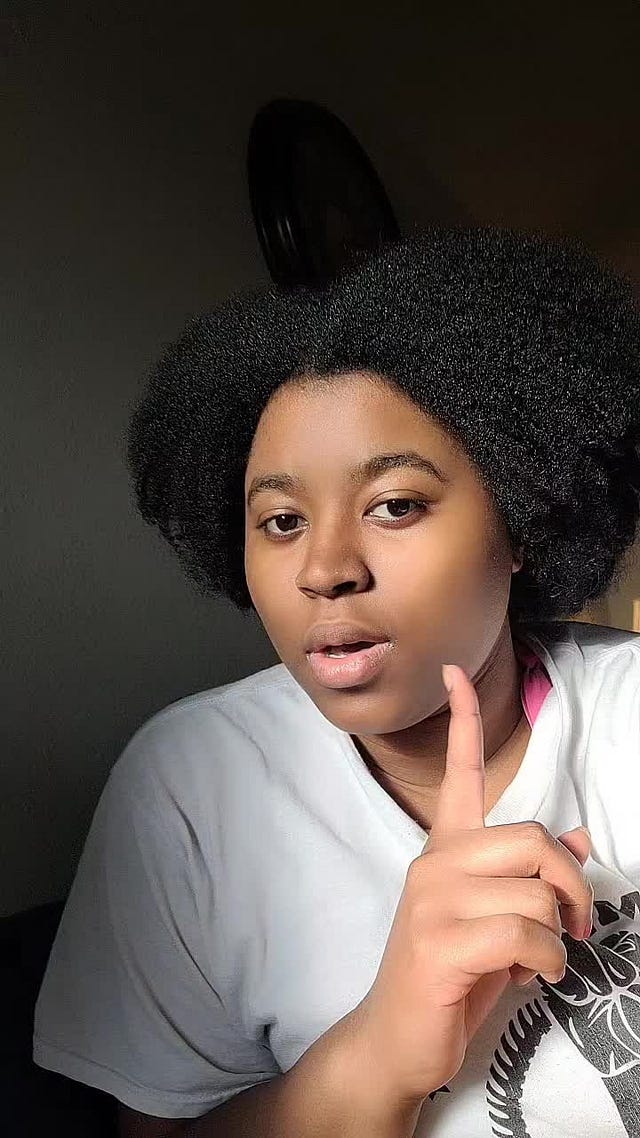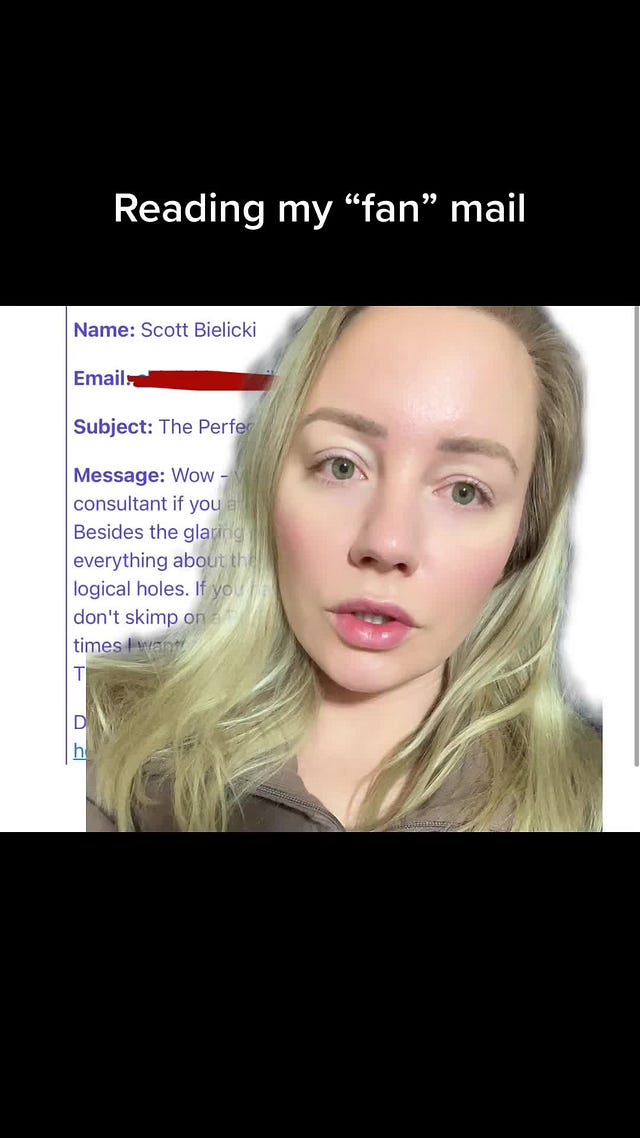Don’t Call a Reviewer on Goodreads a Bitch.
The Sarah Stusek Situation on BookTok & Beyond.
Welp. I did it.
I accidentally went viral on TikTok, but I absolutely did not mention in any of my follow-up videos a sentiment of “Wow, I didn’t expect that to blow up!”
But boy, howdy, did I want to gush and lament at the overwhelming, anxiety-inducing influx of notifications I received across a couple of hours last night.
It was very “right place, right time” which has happened to me one other time on Medium. I’m still one of the only Google search results for “Ra The Ken Doll,” and ironically, that was also about a thing on TikTok.
I stepped right into the collision of BookTok and tea being split. An author thought it was a good idea to harass and attack a reviewer from Goodreads for leaving a 4-star review. The cherry on top was the author, Sarah Stusek, calling the reviewer a bitch and later doxxing her.
She would later walk it all back, claiming it was a joke and she’s a comedian.

 Tiktok failed to load.
Tiktok failed to load.Enable 3rd party cookies or use another browser
Authors Gone Wild
This isn’t the only time an author has gone wild and inappropriately harassed a reviewer on Goodreads. Piper CJ came under criticism on BookTok (and online in general) for her and her editor’s comments on a review of her book on Goodreads. At the time, Piper’s book was self-published, and now she’s acquired a traditional deal.
Piper CJ is someone I’ve encountered many times on my FYP, and I would consider her somewhat chronically online in the same way I’d consider myself chronically online. Basically, we’re on TikTok, we’re online, we participate in online society and community.
Sarah Stusek (or @sarahshooots on TikTok) more than likely falls into a similar camp of online residency.
In my opinion, these authors are green and unseasoned in the industry, but it feels like common sense to not react publicly to “bad” reviews. But then again, I have had many conversations with my authors about how to handle less-than-glowing reviews of their books.
There’s almost a knee-jerk, human instinct to want to clarify or respond to such a review with “No, wait, you got it all wrong! That’s not what I meant!” And thankfully, for my sanity, most of the authors I work with are not chronically online like me or Piper CJ or Sarah Stusek.
It’s totally appropriate for an author to commiserate or rant about these matters to their publisher, their agent, their confidants, but it is wholly inappropriate to publicly address a reviewer, call them a bitch or harass them.
What I didn’t realize initially about the Sarah/Goodreads situation when my FYP delivered the fresh hot Booktok tea was the fact that her book was still in pre-order. Out of the eight early reviews for her book Three Rivers, all but one was a 5-star review on Goodreads.
The 4-star review Sarah zeroed in on has since been modified, so I do not have the original review available. However, from my understanding, the only note of criticism was something to the effect of “The ending was a little predictable, but other than that, it was incredible.”
You can watch a clip of Sarah’s original video here from this creator, Rae (@latearareads). It includes some of the original review.
Speculation
Another thing I figured out was who Sarah’s publisher was: SparkPress, a hybrid publisher.
And funnily enough, I work at a hybrid publisher, so I made a TikTok with my best guesses as to what will happen now that SparkPress has announced they are parting ways with the author.
More than likely, her book is fully developed and produced, and if her agreement looks anything like our agreements, Sarah should have retained full rights and will likely be given her final files (epub, print interior, full cover, etc.)
As of writing this, Sarah claims on her TikTok that she upgraded her publisher and will now have two books release this year.
While SparkPress has claimed to have parted ways with Sarah (though they don’t mention her by name in the statement, but it’s pretty clear otherwise who they are referring to), we will have to wait until the metadata updates for the book.
Currently, Amazon still lists SparkPress as the publisher, so I’m anticipating that to change at some point whether Sarah has secured another publisher or if she self-publishes.
In all honesty, I do not feel comfortable speculating too much on what will happen next for Sarah, and I am not the end-all-be-all judge of what she “deserves.”
I do believe she owes the reviewer an apology, and I do believe she will garner some more attention and sales for her book whenever and wherever it releases. Unfortunately, bad behavior is rewarded in scandal and attention.
Also, I feel insanely uncomfortable scrolling through the comments on Sarah’s recent TikToks, telling her to get on medication or calling her mental health into question.
Can we just not do that, guys? It’s disturbing and inappropriate. And I don’t believe in punching down.
How Authors Should Respond to Reviews
Best practice is just not. Reviews aren’t for authors anyway.
Now, I advise the authors I work with to use blurbs and endorsements for their books in any promotional content or marketing, occasionally spotlighting a high-rating from Amazon or Goodreads.
But frankly, until the Sarah Stusek situation, never had I considered instructing my authors not to make a TikTok about a review or responding directly to a review online.
Of course, there are instances of authors using a misunderstanding or a negative review to their advantage.
Jeneva Rose was an example brought up in my comments, and I have actually seen her come across my FYP prior to this, talking about The Scott Saga. A man named Scott decided to email author Jeneva Rose the day before Christmas to let her know how much he disliked her book, The Perfect Marriage.
Now, Jeneva hides Scott’s email, but we see his full name in the screenshots. Aside from that, the tone of these TikToks is a deadpanned “listen to these negative reviews this guy emailed directly to me.”
One of her updates on the Scott Saga shows her updated bio that now includes “Scott’s pen pal” in her accolades.
I highly encourage you to catch up on the Scott Saga on Jeneva’s TikTok (which she has a playlist dedicated to on her profile) because it should be pretty freaking obvious the difference between how Jeneva’s handling a negative review and how Sarah handled a 4-star review with very little criticism.
Do I recommend every author follow Jeneva’s example? No, God no, please. This is a unique scenario with the right factors aligning together for a reader community to rally behind the author.
You can’t always plan for creative success in these situations, and thankfully, it appears Jeneva is making lots of lemonade from Scott’s lemons without breaking any laws or being super mean or invading a reader space. Which Scott didn’t post his review on Goodreads or Amazon, he emailed directly to the author.
Like I was saying, reviews are not for authors; they are ultimately for readers.
Reviews and ratings can help authors and their books get seen, and if you ever want to run an ad on Facebook or Amazon, it’s more effective to have a healthy heap of reviews already posted. (And yes, authors run ads on books. Advertising and marketing are not inherently icky or insidious.)
The contents of a review are not there to tell authors what to do better and what to axe from their storyline—that’s their editor’s job.
A review helps other readers decide if that book is worth their time and money, whether it be a profound, compelling read or a trashy, entertaining, unhinged mess of a read.
We all like our emotionally moving cinematic masterpieces as well as our gossipy, juicy-wet, mind-numbing reality shows, including our TikTok drama.
That being said, it’s probably best not to call someone a bitch on the internet—from either side of the argument.



